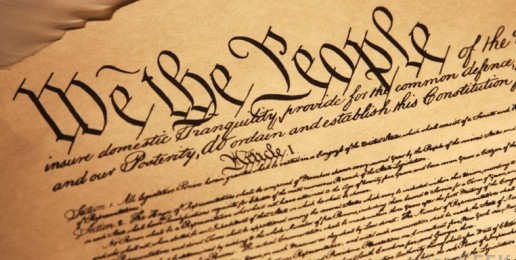
Over the course of the past few months I gathered articles about the question of “judicial supremacy” — are U.S. Supreme Court decisions “the law of the land,” or are they rulings on cases?
Here is that page of excerpts, quotes, and links: Judicial Supremacy: Not in the U.S. Constitution, Not the Intention of the Founding Fathers.
Republicans and conservatives rarely even attempt to disseminate information about the U.S. Constitution to the uninformed and misinformed. Of course, that is a bit much to ask when too many on our side aren’t even clear on what it says.
For many who have attended most law schools in the country, the chances are greater than not that they came away with the idea that, not only is the U.S. Supreme Court the highest court in the land, but it is also the supreme governing body. Why do so many law school graduates think that? Because that is what law schools teach.
What is sad is that so many conservatives fall for the notion of judicial supremacy. As to why they do, I can only engage in a bit of psychological speculation.
Here are just eight possible reasons why conservatives fall for and then defend the theory of judicial supremacy:
1.) Because they weren’t actually taught the U.S. Constitution — but rather the opinions of U.S. Supreme Court justices. Yes, this is an important distinction if you actually want to understand the U.S. Constitution, and not merely the written opinions about the U.S. Constitution by unelected lawyers.
2.) Because even as they were taught to consider legislative debate and the writings of legislators when it comes to interpreting statutes, they completely ignore the words of the Founding Fathers regarding the design and purpose of the U.S. Supreme Court.
3.) Because they absolutely hate the idea that they were taught wrong. After all, if they were misinformed about this, what else might they have been misinformed about?
4.) Because it flies in the face of the idea that lawyers are an elite class — if those nine lawyers are no longer the oligarchy they were led to believe it is, their sense of elitism is threatened.
5.) Because they can’t conceive of how American government can work if it’s all about checks and balances and divided power — someone has to be in charge, right?
6.) Because they can’t grasp that the power is invested in the People, not in whatever majority happens to sit on the Court at any given time.
7.) Because just like the idea that “any kid can grow up to be president” is lovely, so too is the notion that “any lawyer can some day be appointed to be that fifth and deciding vote on U.S. Supreme Court cases and thus the ruler of the land — superior to the lowly elected U.S. President down Pennsylvania Avenue and those nobodies that populate the U.S. Senate and U.S. House across the street.“One ‘us’ needs to be in charge.”
8.) Because “I went to law school and you didn’t, therefore I know better.”
This last one is actually my favorite of them all, since I enjoyed both a year of “Con Law” in undergrad while studying political science and political philosophy, and one year while in law school. The United States Constitution wasn’t written based upon the opinions of legal minds but rather that of political philosophers, political scientists, and statesmen. Why some think lawyers have special knowledge about the U.S. Constitution is a mystery to me.
Within the past few days I added two articles to that page of links. First, one I’d missed from late June. Second, a new article that posted just three days ago. Here are excerpts from both of them:
The Myth of Judicial Supremacy
By Paul Moreno (June 26, 2015)Forget Marbury v. Madison. Judicial supremacy is mostly an invention of the Warren Court. The Supreme Court this morning declared that states cannot limit marriage to one man and one woman.
But this is not the last word on the question. Article VI of the Constitution reads: “This Constitution, and the laws of the United States made in pursuance thereof; and all treaties . . . shall be the supreme law of the land . . . ” The idea that Supreme Court interpretations of the Constitution are the supreme law of the land is a very recent contention.
When the Constitution was written and for a long time thereafter, many doubted that the Court had the authority to interpret the Constitution at all — in other words, they believed that the Court had no power of “judicial review.” Alexander Hamilton, in Federalist 78, made the classic argument that, given a written constitution established by the sovereign people, the Court had no choice but to maintain the supremacy of the people’s Constitution when it was alleged to be in conflict with an ordinary law passed by their representatives.
Today’s legend of judicial supremacy begins with Chief Justice John Marshall’s opinion in Marbury v. Madison (1803). In fact, Marbury was quite a modest decision, in which Marshall held that Congress could not extend the jurisdiction of the Court beyond what the Constitution had provided. (And it is unlikely that the act in question did so anyway.) The decision was hardly ever cited for the next century.
Marshall never made any claim of judicial supremacy, nor did the country accept any such principle. Presidents Jefferson and Jackson resisted the idea that the Court had a monopoly on constitutional interpretation.
Moreno goes on to explain that “The myth of judicial supremacy began near the end of the 19th century, when conservatives sought to justify unpopular Court decisions — especially the 1895 decision holding the income tax unconstitutional.”
And that “Under Chief Justice Earl Warren, the Court went on to ever bolder exercises of judicial power”:
The first rhetorical expression of judicial supremacy came in Cooper v. Aaron (1958), when a federal district court, following the High Court’s decision in Brown v. Board of Education (1954), had ordered the desegregation of Central High School in Little Rock, Ark. The justices claimed that Marbury v. Madison had “declared the basic principle that the federal judiciary is supreme in its exposition of the law of the Constitution, and that principle has ever since been respected by this court and the country as a permanent and indispensable feature of our constitutional system.” For the first time, the Court now added that “the interpretation of the Fourteenth Amendment enunciated by this court in the Brown case is the supreme law of the land.” Civil rights became such a popular cause that the Court has been living off the moral capital of Brown ever since.
Can you imagine how upset lawyers are when they learn about the short term memory problem of their esteemed professors?
I encourage you to read Moreno’s entire article here.
Here an excerpt from our next new link, where the writer touches on the confusion of many that argue against judicial supremacy:
Why Judicial Supremacy Isn’t Compatible with Constitutional Supremacy
By Ramesh Ponnuru (September 10, 2015)A pro-choice voter in New Hampshire had a question for John Kasich, the Republican governor of Ohio, who was making the rounds as a presidential candidate: Would he “respect” Roe v. Wade even though he is a pro-lifer? Kasich answered, “Obviously, it’s the law of the land now, and we live with the law of the land.”
Whether he knew it or not, Kasich had wandered into a debate over the courts, one in which some of the other presidential candidates are also participants. Mike Huckabee, the former governor of Arkansas, has denounced “judicial tyranny.” When five justices ruled that the Constitution requires governments to recognize same-sex marriage, he scoffed that the Supreme Court was not “the Supreme Being.”
It’s an often-heated debate. Huckabee’s side says that the courts have established a “judicial supremacy” at odds with the actual constitutional design; the other side says that people like Huckabee are threatening the rule of law. Both sides have some reasonable points, and both could profit from conducting the debate at a lower level of abstraction.
Huckabee’s side of the argument is of course the weaker one in our political culture. Think of how often people say, without realizing they are making a controversial claim, that abortion is “a constitutional right” or that laws against it are “unconstitutional.” The Supreme Court has ruled to that effect; our shorthand treats its rulings as either correct by definition or authoritative in such a strong sense that we should describe them as though they were. “The Constitution is what the judges say it is,” as Chief Justice Charles Evans Hughes said before he was on the Court. Even when arguments about judicial supremacy appear to have no practical import, they lie beneath judgments about how we should talk about judicial decisions.
The case against this way of thinking holds that judicial supremacy is incompatible with constitutional supremacy. The courts can get the Constitution wrong; if they could not, there would be no point to justices’ trying to get it right by reasoning about the Constitution. Judicial review, though not explicitly authorized by the Constitution, can be inferred from it: In cases where the courts have to decide whether to apply the Constitution or a statute that conflicts with it, the higher law has to take precedence. The case against judicial supremacy rests on a similar inference: In cases where a judicial interpretation of the Constitution is at odds with the actual document, it is the latter that deserves the allegiance of citizens and officeholders. Kasich is therefore wrong: The Constitution is “the law of the land,” not Roe. (You can look it up in the Constitution’s sixth article.)
Read more: National Review
This article was originally posted at JohnBiver.com






















